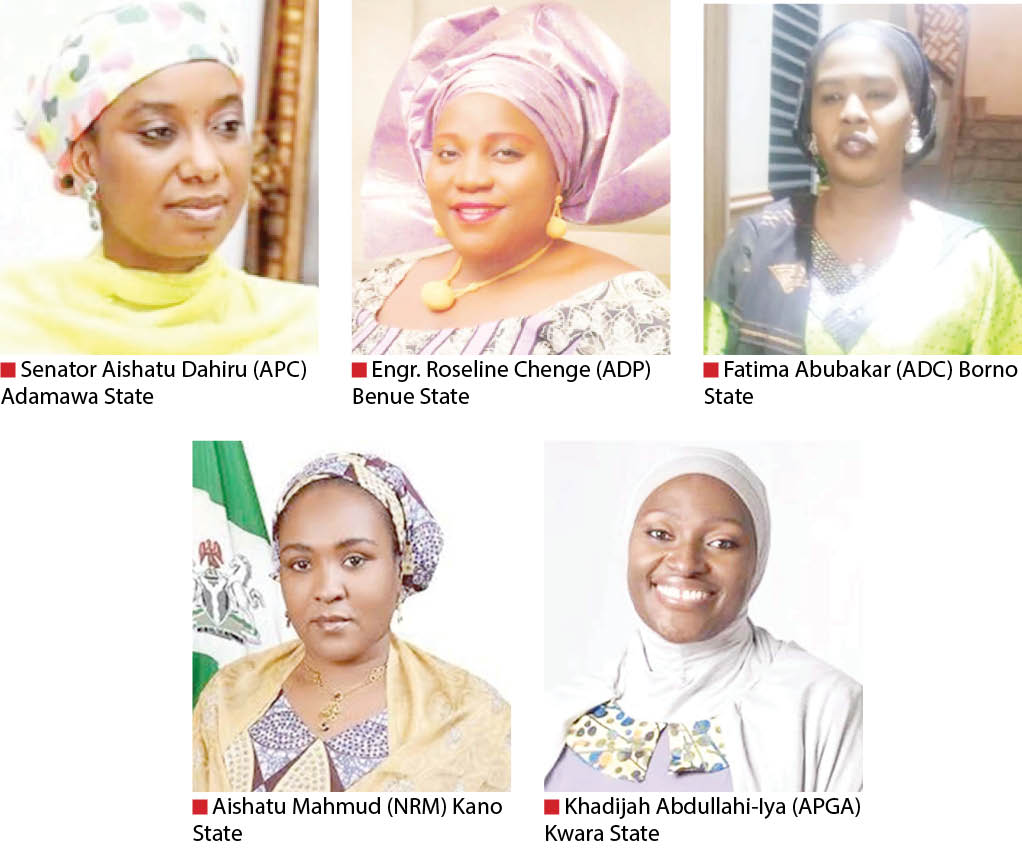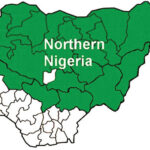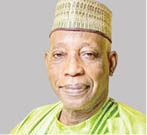As Nigerians troop out in states today to elect state governors and state Houses of Assembly members, Daily Trust Saturday profiles the 11 female candidates eyeing governorship seats in the North.
In the 19 northern states of Nigeria, there are 11 female governorship candidates, vying under various political parties, according to the final list of candidates as released by the Independent National Electoral Commission (INEC).
In this report, Daily Trust Saturday profiles the 11 female governorship candidates of Northern Nigeria.
Aishatu Dahiru Ahmed (Binani) is the governorship candidate of the All Progressives Congress (APC)in Adamawa State.
- Menace of street kids’ begging in Lokoja
- Your silence condemnable, Atiku hits Buhari, Tinubu over MC Oluomo’s threat to Igbos
Senator Aishatu Dahiru, currently the only female senator from the north in the 9th Assembly, was a former member of the House of Representatives (Yola North and Girei South) under the Peoples Democratic Party (PDP) between 2011 and 2015.
Daily Trust Saturday reported that during the APC primaries, Binani polled 430 votes defeating contestants like Nuhu Ribadu (pioneer EFCC chairman), Muhammadu Jibrilla Bindow (a former Adamawa State governor) and Abdurrazaq Namdas.
Her emergence as the flag bearer of the APC in the state has been considered a feat, by gender advocates, for a woman in a leading party as APC.
Since the creation of APC in 2013, male candidates have been known to fly the party’s flag at different levels, though it is not the first time a female governorship candidate is emerging.
In 2015, the APC produced late Aisha Alhassan (Mama Taraba) as the governorship candidate in Taraba State.
Binani, known to be politically fierce and relentless, showed no signs of cowering during her legal battle with Nuhu Ribadu. Daily Trust Saturday reports that after a federal high court sitting in Yola annulled the primaries and ordered Binani not to parade herself as the party’s candidate for the 2023 governorship election, she appealed the case until she was confirmed as the duly elected APC governorship candidate in Adamawa.
However, some residents of Adamawa have expressed divergent opinions on the candidacy and chances of a woman for the state’s apex office.
Abdulaziz Dahiru who spoke in Hausa said Binani is no doubt loved by many in the state.
He added that “from all indications, Insha Allah, she will be victorious owing to the population of her supporters. She is a woman of compassion; always willing to help those in need. We hope she emerges victorious,” he said.
Amina Dahiru, another resident, believes in a female candidate because “Normally, women have a caring heart and she has the passion to rule. She can do more than we think,” she said.
John Mark Barau said “Adamawa is not yet ready for a female governor because we in Africa do not believe that women should rule over men and therefore Nigeria will not give a female the position at this time.”
Ibrahim Muhammed who attested to being a beneficiary of Binani’s benevolence, says he only wishes her success.
Meanwhile, Benue State has two women contesting for the governorship against 15 male counterparts.
Engr Roseline Chenge, a mechanical engineer by profession is one of the female candidates under the platform of the Action Democratic Party (ADP).
During an exclusive interview with Daily Trust Saturday, she was optimistic of victory at the polls over her male counterparts.
Mrs Chenge said despite losing the primaries to Governor Gabriel Suswan in 2007 while under the PDP, she joined the APC where she lost again to Governor Samuel Ortom in 2015 which later inspired her choice for the ADP.
On her drive to occupy the apex seat in the state, she said “being a female mechanical engineer and having worked in the private sector, seeing the lapse of industrialization of Benue, I got engineered into vying for the number one position in Benue State. Then recently, I became overwhelmed by the security challenges of Benue State, and that made me to decide that this 2023, I am coming to solve the security challenges in Benue State,” she said.
Chenge, while lamenting the poor participation of women in leadership, said Nigeria should consider declaring a state of emergency on the participation of women in governance.
Aondona Catherine of the Zenith Labour Party (ZLP) is also a female contender.
She was a one-time member of the House of Representatives under the United Nigeria People’s Party UNPP in 2003, a position she held as the only representative in the legislative arm under her party, the UNPP.
In Borno State, Fatima Abubakar is the lone female gubernatorial candidate under the platform of the African Democratic Congress (ADC).
Daily Trust Saturday reports that she is famous for her House-to-House campaign technique, with which she is optimistic of winning against the incumbent Governor Umara Zulum.
In one of her interactions with journalists in the state, Hajiya Fatima expressed concern over the increasing political violence against candidates, and called on the Inspector General of Police (IGP) Usman Alkali to beef up security for candidates, especially female ones, during the electioneering process. Though she does not consider it a threat to her ambition, she hopes that her courage to stand as the only woman in the race will spur more women to aspire.
Binta Umar is the only female governorship candidate in Jigawa State under the umbrella of the Action Alliance (AA).
Daily Trust Saturday reports that her campaign promises are around empowering women and youth in the state. She is positive her victory at the polls will provide better governance for her people.
At a media parley organized by Women Radio in Abuja, Hajiya Binta expressed worry over the political bottlenecks irking her campaigns, calling for increased support of women.
Kano State, the commercial hub of northern Nigeria, has two female governorship candidates contesting alongside 15 male counterparts.
Furera Ahmed of the Boot Party (BP) and Aishatu Mahmud of the National Rescue Movement (NRM) are the two women in the Kano governorship race.
In a telephone interview with Daily Trust Saturday, Hajiya Furera who spoke in Hausa said the poor representation of women in the political space is one of the reasons women like her are contesting.
However, she noted that being a female politician in her clime is challenging. “People feel a woman in politics is a prostitute, or is above her husband which is not true,” she said.
If elected governor in Kano State, Furera promised to work to end the marginalization of women and provide opportunities for young people, among other developmental projects in the state.
In Kwara State, Jaiyeola Moturayo Deborah of the Allied Peoples Movement (APM) is the lone female governorship candidate contesting the apex seat against 13 male contenders.
In Niger State, Khadijah Abdullahi-Iya of the All Progressives Grand Alliance (APGA) is the first female governorship candidate in Niger’s 47 years of existence.
During an interview with Daily Trust Saturday, Khadijah promised to improve the educational sector, healthcare delivery, agriculture and wipe the tears of her people.
She said that her government will ensure women get a 50 per cent chance at leadership in the state, which will inspire more women to be at the decision-making table.
Khadijah added that her chances are “very high” saying that women have “become conversers and they are the ones driving the initiative and the mission,” she said.
Khadijah was vice presidential candidate in 2019 under the Alliance for New Nigeria.
Other female gubernatorial candidates include Nasarawa State’s Patricia Danlami who’s contesting under the platform of the Action Democratic Party (ADP).
In Zamfara State, Hadiza Usman of the Zenith Labour Party (ZLP) is the lone female guber candidate amidst 13 male contenders.
Breaking the mould
In the 36 states of Nigeria, no woman has been elected governor, though a few have contested in previous elections since return to uninterrupted democracy in 1999.
The first female governor in Nigeria, Dame Virgy Etiaba, functioned as Anambra State governor for six months following the impeachment of her boss, Peter Obi, in November 2006.
In 2021, during the corona virus lockdown, Kaduna State Governor Mallam Nasir El’rufai handed over to his deputy Dr. Hadiza Balarabe in acting capacity after he tested positive for COVID.
This made her the first female acting governor that northern Nigeria has ever produced.
Ever since, the closest a woman has come in governance is Deputy Governor.
Political scientist, Associate professor Abubakar Kari of the University of Abuja, said the trend of picking women as running mates for governorship aspirants rather than have them contest for the seat is mere “tokenism”.
He added that despite moves by some women to contest elections, existing structures will give then no chance to win, “it is a historical thing.”
According to Kari, the “issue is about empowerment, opening the political space to accommodate women.”
Investigations show that about 101 women across the 28 states are running mates to governorship candidates in the March 18, 2023 election, while only 6 percent are gubernatorial candidates. This implies that out of about 418 governorship candidates across 28 states, only 24 are women.
The number dropped in 2023, compared to the 85 female governorship candidates in 2019.
This, according to experts, might be linked to the reduction in the number of registered political parties by INEC, from 92 in 2019 to 18 in 2023.
Low women in politics
Reacting to the low number of women in the political arena, Nigeria’s Minister of Women Affairs Pauline Tallen told Daily Trust Saturday that without having women at the decision table “We will not make any progress and our laws would not be right, so I am appealing that all political parties should be more gender sensitive. It’s not that women have not made any attempt to come out, they have come out, but they have been strangulated by men,” she said.
Though there has been increased concern about the low publicity of most of the governorship candidates and their choice of smaller or newer political parties against the “big ones”, Dr Nafisa Atiku – a political scientist at the Shehu Musa Yar’Adua Foundation, believes women running for political positions in Northern Nigeria are breaking the roadblocks and paving the way for other women who will come behind them, even if they don’t win.
She added that “before there could be a female Vice president in the United States who is Kamala Harris, there had to be a Hilary Clinton who ran for office and lost.”

 Join Daily Trust WhatsApp Community For Quick Access To News and Happenings Around You.
Join Daily Trust WhatsApp Community For Quick Access To News and Happenings Around You.

